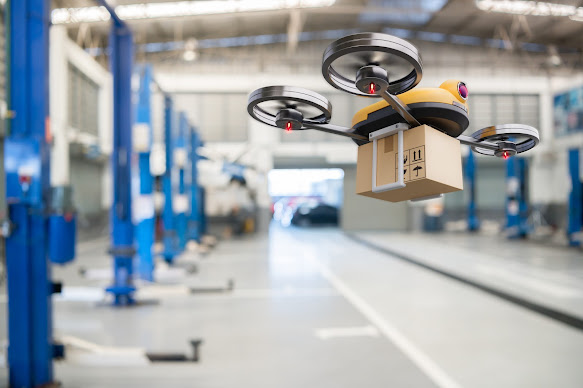''' '' ROBOTS
-LEASHED-
RESCUE '' '''
E-COMMERCE COMPANIES ARE EMBRACING AUTOMATION to do jobs that very, very few want. The supply chain broke. Robots may just help fix it.
Locus Robotics, which manufactures autonomous robots, said its machines are meant to complement workers.
A day spent wandering the Home Delivery World trade show inside the Pennsylvania Convention Center revealed how supply chain companies are pursuing automation and flexible staffing as antidotes to rising wages.
They are eager to embrace robots as an alternative to human workers. Robots never get sick, not even in a pandemic. They never stay home to attend to their children
More than two years into the pandemic, persistent economic shocks have intensified traditional conflicts between employers and employees around the world.
Higher prices for energy, food and other goods - in part the result of enduring supply chain tangles -have prompted workers to demand higher wages, along with the right to continue working from home.
Employers cite elevated costs for parts, raw materials and transportation in holding the line on pay, yielding a wave of strikes in countries like Britain.
Nearby, an Israeli startup, SafeMode, touted a means to limit the notoriously high turnover plaguing the trucking industry. The company has developed an app that monitors the actions of drivers - their speed, the abruptness of their braking, their fuel efficiency - while rewarding those who perform better than their peers.
A COMPANY SHOWED VIDEO OF ITS DRONES delivering cakes into the backyards of customers' homes. Welcome, to the supply chain breaks and watch robots fixing it. ''Welcome to The World Students Society.''
PROUD PAKISTAN would be well advised to set up a master squadron of ' delivery drones ' to help efficiently distribute Flood Relief all over the country.
What does the future hold? ' Zilli, Can you, please, check on that. '
FEAR, HOPE AND RESILIENCE. Does the country have the capacity, the urgency and the motivational honour to do so?
A drone company, Zipline, showed video of its equipment taking off behind a Walmart in Pea Ridge, Ark, dropping items like mayonnaise and even birthday cake into the backyards of customers' homes.
Another company, Droneup, trumpeted plans to set up similar services at 30 Walmart stores in Arkansas, Texas and Florida by the end of the year. But the largest companies are focused on deploying robots.
Locus, the manufacturer, has already outfitted 200 warehouses globally with its robots, recently expanding into Europe and Australia.
Locus says its machines are meant not to replace workers but to complement them - a way to squeeze more productivity out of the same warehouse by relieving the humans of the need to push carts.
But the company also presents its robots as the solution to worker shortages. Unlike workers, robots can be easily scaled up and cut back, eliminating the need to hire and train temporary employees, Melissa Valentine, director of retail global accounts at Locus, said during a panel discussion.
THE STAKES are especially high for companies engaged in transporting goods. The executives contend that the ' Great Supply Chain Disruption ' is largely the result of labor shortages.
Ports are overwhelmed and retail shelves are short of goods because the supply chain has run out of people willing to drive trucks and move goods through warehouses, the argument goes.
Some labor experts challenge such claims, while reframing worker shortages as an unwillingness by employers to pay enough to attract the needed numbers of people.
''This shortage narrative is industry lobbying rhetoric,'' said Steve Viscelli, an economic sociologist at the University of Pennsylvania and the author of ''The Big Rig : Trucking and the Decline of American Dream.''
''There is no shortage of truck drivers,'' he said. ''These are just really bad jobs.''
Robots can ''solve labor issues,'' said Nathan Roy, director of distribution center operations at Albertsons, the grocery chain, who previously held executive roles at Amazon and Target. ''You can find a solution that's right for your budget. There's just so many options out there.''
As Mr.Ray acknowledged, a key impediment to the more rapid deployment of automation is fear among workers that robots are a threat to their jobs. Once they realize that the robots are there not to replace them but merely to relieve them of physically taxing jobs like pushing carts, ''it gets really fun,'' Mr.Ray said.
But Bruce Dzinski, director of transportation at Party City, a chain of party supply stores, presented robots as an alternative to higher pay.
''You couldn't get labor, so you raised your wages to try to get people,'' he said. ''And then everybody else raised wages.''
Robots never demand a raise. The Supply chain broke, Robots may help fix it.
The Honour and Serving of the Latest Global Operational Research on Supply Chains, Automation and Robots, continues. The World Students Society thanks author Peter S. Goodman.
With respectful dedication to the Students, Professors and Teachers of the World. See Ya all prepare and register for Great Global Elections on The World Students Society - the exclusive ownership of every student in the world : wssciw.blogspot.com and Twitter - !E-WOW! - The Ecosystem 2011 :
Good Night and God Bless
SAM Daily Times - the Voice of the Voiceless

.png)


0 comments:
Post a Comment
Grace A Comment!